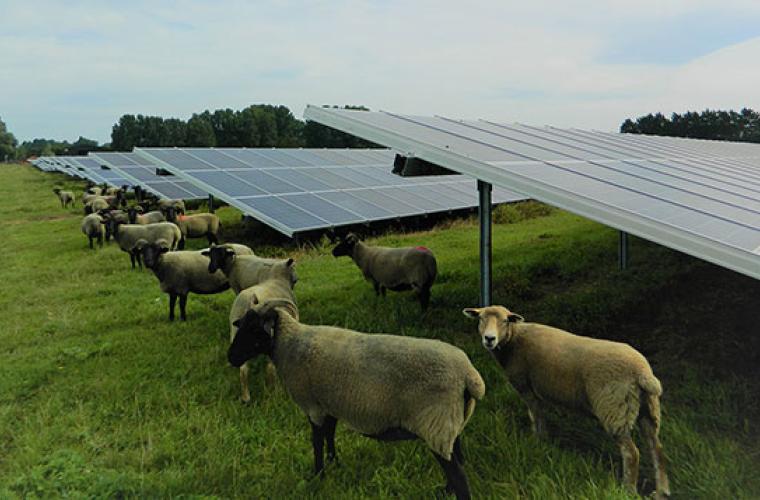Councils have jointly written to the Secretary of State for Energy and Net Zero, Claire Coutinho MP, calling for a change of approach in delivering net zero.

Today the Local Government Association (LGA), District Councils Network (DCN), County Councils Network (CCN) and London Councils have jointly written to the Secretary of State for Energy and Net Zero, Claire Coutinho MP, calling for a change of approach in delivering net zero, which they say will be essential to reach the UK’s net zero targets and maximise benefits for communities.
The organisations – which collectively represent cross-party councils in England – are calling on government to improve support for local climate action, a move which government’s own research found would achieve net zero by 2050 for half the cost of a national approach and deliver three times the financial returns and wider benefits.
Councils have an impact on over 80 per cent of an areas’ emissions, and direct impact over a third of emissions given their central role in housing, transport and energy.
Yet local authorities currently have no clear role in delivering the Government’s strategy to reach net zero. They also receive no core funding for local climate action. Instead, they are forced to bid for short-term national pots of funding, which come and go over time, wasting resource and creating uncertainty that blocks private investment.
Councils are calling on the Government to back local climate action, by:
- Putting in place a national climate action framework with policy, regulatory, and investment certainty up to 2050, with set milestones and a clear role for councils leading local climate action.
- Providing all councils with adequate and stable core funding to take forward climate action across their own services; multi-year place-based funding allocations to lead decarbonisation across their areas and support to secure greater private investment into local climate action.
- Introducing a local climate action test ensuring all government policy and funding decisions – from housing to skills - contribute to local climate action.
Cllr Darren Rodwell, environment spokesperson for the LGA said:
“Councils are leading transformative projects across the country, but their innovation is being held back by the national approach to the transition to net zero.
“With an impact on over 80 per cent of emissions from their area – from transport and housing to renewable energy, government will not reach net zero without empowering councils to deliver local climate action in every village, town and city. With the right support, local areas could deliver net zero quicker and for less money, while boosting the local economy and ensuring local people benefit.”
Cllr Sam Corcoran, CCN Spokesperson for Climate Change said:
“CCN members are providing leadership and working with a range of partners to deliver ambitious projects that focus on climate action. However we must up the pace and act now if we are to drive the green agenda and meet our net zero targets. Our members know their areas best, and local solutions have been shown to provide better value for money and provide a wide range of benefits. We are therefore delighted to join forces with other local government bodies to call on the Government to improve support for local climate action.”
Cllr Sarah Nelmes, DCN Spokesperson for Environment, Sustainability and Net Zero said:
“Districts Councils are focused on delivering ambitious climate action to cut emissions. The path to net zero will look different for our rural and coastal communities compared to more densely populated areas. DCN member councils are committed to supporting their residents to decarbonise their homes and make planet-friendly changes to reduce their own emissions.
“Districts have significant expertise and a strong understanding of barriers to local action which has enabled us enabling us to deliver so much already. If all local authorities receive stable funding, we can work in partnership with national government and neighbouring authorities to deliver net zero at pace. Empowering councils to tailor schemes to our places will support uptake and ensure our residents’ needs are at the heart of all local climate action.”
Cllr Kieron Williams, Chair of London Councils’ Transport and Environment Committee, said:
“As the largest city in the UK, London has an enormous role to play in reducing national carbon emissions. Councils across our city are providing the local leadership needed to make this happen, through working hand in hand with our communities and businesses to cut carbon emissions in ways that also create good jobs, bring down fuel bills and enable Londoners to live healthier lives.
“London boroughs’ expertise and local relationships are already proving invaluable. Real partnership between local and national government is vital if we are to continue this progress. With a clear framework, shared goals and stable funding, councils could do even more.”
Ends
- Full letter available here
- The LGA’s Autumn Statement submission warns that councils in England face a funding gap of £4 billion over the next two years. In its submission to the Chancellor, the LGA said the Government needs to provide immediate funding so councils can deliver the 2023/24 budgets they set this year and ensure that councils have sufficient resources to set balanced budgets next year without having to make drastic cuts to services. It is accompanied by appendices on key areas of council activity that are experiencing sharp financial and/or demand pressures (adult social care, children’s services and housing and homelessness support).
- Delivering net zero is a priority for councils, with the submission calling on the Government to Back local climate action by devolving approaches on ten missions: public trust, retrofitting social and fuel poor homes, public buildings, local energy generation and grid investment, whole place transport, jobs and growth, the natural world, placemaking, rapidly escalating adaptation action, and attracting private finance.
